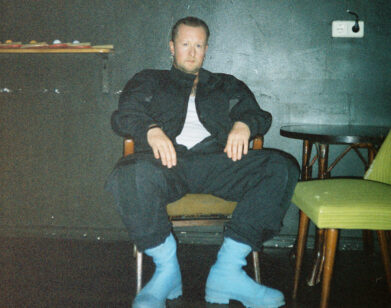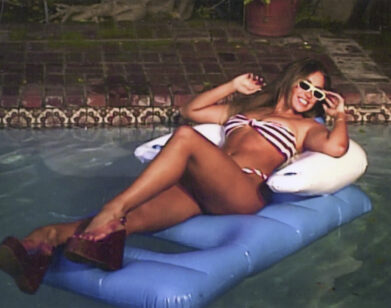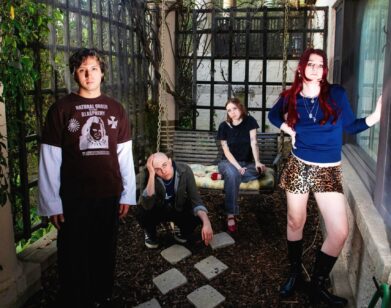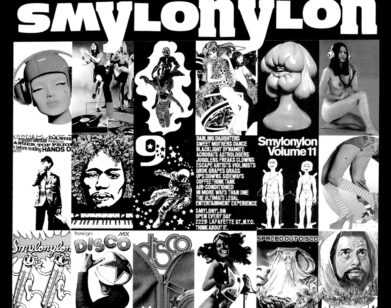Yoko Ono on Lennon, Love, Feminism, and Japan
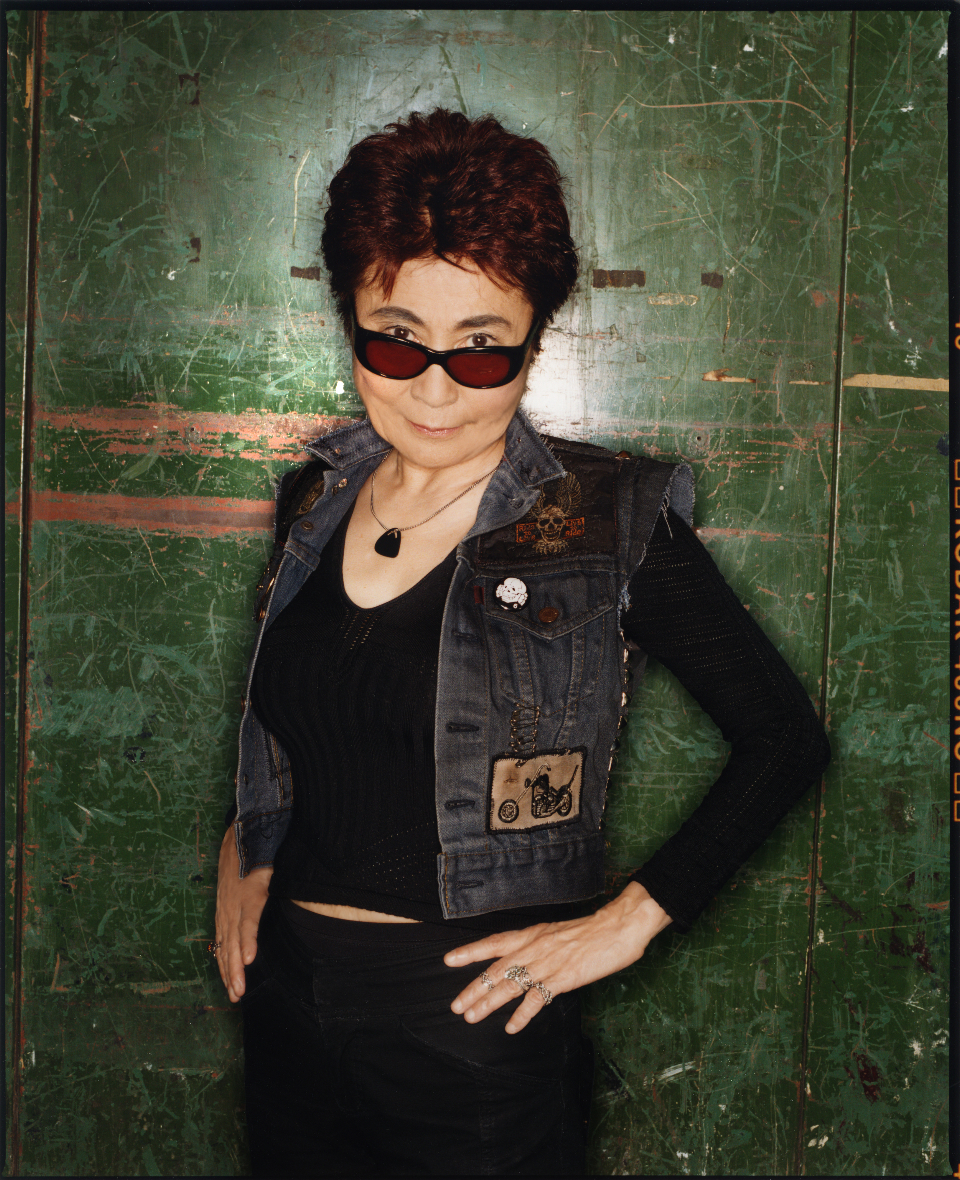
YOKO ONO. PHOTO COURTESY OF MICHAEL LAVINE
With a new dance hit, “Move on Fast,” and a forthcoming benefit show for Japan on March 27th at Columbia University’s Miller Theatre, Yoko Ono attended at the South by Southwest music festival for an official interview and to belt her signature guttural cackles with the Plastic Ono Band at Sean Lennon’s Chimera Music showcase. We met with Ono in her suite at Austin’s Four Seasons Hotel before her public appearances. Dressed all in black, busty in a low-cut shirt, and wearing a guitar-pick necklace, Ono was exuberant, smiley, and warm.
DEENAH VOLLMER: Hi, I’m Deenah with Interview magazine.
YOKO ONO: It’s been a long way with Interview magazine, hasn’t it? I remember when I was standing and I saw that Andy Warhol was coming from the next block. He was walking and then he goes into some shop and then he comes out and then goes into another shop. I said, “What are you doing?” He said, “Well, I am trying to make them take Interview and put it there.” I thought, “Wow, you do it all yourself.” In the old days we did everything ourselves, but I thought it was very sweet he was doing that. That’s how Interview came about, you know.
VOLLMER: That’s amazing. I understand this is your first time in Austin.
ONO: I know! It’s the first time. It’s really amazing.
VOLLMER: How do you like hearing bands everywhere you go, often many at the same time?
ONO: I love the feeling that all of us came to Austin, Texas, just making music. It’s great.
VOLLMER: How does it compare to other festivals you’ve played at?
ONO: I think it’s slightly different from the usual festival we go to, you know. You’re waiting for your turn and there are a few biggies, but I think there are more young people here or something. There is an incredible energy generating. This is good.
VOLLMER: Was it through your son Sean that you came to SXSW this year? Did he have a big part in bringing you here?
ONO: I think that Sean came before, but I just never had a chance to do it. This time I thought, ok I better go. Because Chimera Music is Sean’s music company, and they were doing it, and they didn’t mind if I joined them. [laughs] So, okay, great. They love it. I better do it.
VOLLMER: Will you be performing solo or playing with your band?
ONO: As Sean put it, the people who are backing you are all there anyway, so why don’t you come?
VOLLMER: Nice. You’re playing at 1 am—that’s pretty late.
ONO: I love that. I said, “1 am, that’s great.” By then everybody is drunk, so I don’t have to worry.
VOLLMER: That’s funny. Being at SXSW feels to me like being inside a bubble, and in light of what has happened in Japan, what do you think our personal responsibility is to the people in Japan, or other people around the world we know are suffering?
ONO: I think the responsibility is mainly for yourself, in a way, because what is happening in Japan is directly affecting the whole world. We have to learn from it. The financial situation is going to go bonkers, like a roller coaster. Oh well, right. It’s going to be a different scene I’m sure. We really have to watch ourselves. At the same time, it’s very important you help the healing of Japan because that’s going to directly affect you.
VOLLMER: But how? What can we do here?
ONO: I immediately put some money in the Red Cross, because Red Cross is really reliable, so if you want to put ten dollars or five dollars, everything helps really, but it’s not just helping monetarily. I think the fact you are doing that makes people feel that people care. Another way is you can write letters and postcards. “I love you and I’m sorry this is happening, but I know you are so resilient and wise people.” The thing is I was there in the Second World War. When the war was over, I went back to Tokyo from where I was evacuating, and they said, [yells] “This is Tokyo, Tokyo’s coming.”
[Her assistants run in.]
ASSISTANT: Did you just call me?
ONO: No, no, I was screaming. The whole thing was like a burnt field because it was bombed. And then people got sheets of metal and collected the sheets of metal and made shacks, you know. And they were all living in shacks. I thought, “What is going to happen to this country?” Japanese are very proud and workaholics. Proud workaholics. They recover the country in such an incredible way. And now suddenly again something is hitting us, but I just want to remind them we are very resilient people. We’re very proud people and we believe in goodness. With this, nobody is expressing anger or spewing terrible words, you know, they’re just sad, that’s Japanese. They’re a very peaceful people. I am very proud of them now and I know that we will recover.
VOLLMER: I hope so. I know you have suffered much in your own life and that you have loved a lot too. What do you believe there is a connection between suffering and loving?
ONO: That’s true. When you are suffering, you become more understanding about yourself, but also about other people’s sufferings too. That’s the first step to understand somebody is to understand their sufferings. So then love follows.
VOLLMER: What do you think is the connection between art and love?
ONO: There is an incredible love in creating art unless somebody is saying, “Hey, let’s just make money,” because it doesn’t work when you do it that way. If you are aiming for that, forget it. Have love and do it.
VOLLMER: In the press I often hear you described as “misunderstood,” but that “the world has finally caught up” with appreciating you. When I was younger, I heard a lot of jokes about Yoko Ono.
ONO: [laughs] Jokes o’ Yoko! [laughs] Word for a joke, that’s true.
VOLLMER: But now, I almost exclusively hear reverence for your art career. Why do you think your art has become so popular today? What do you think changed?
ONO: I don’t know, times changed. I must say, I am very lucky to see it happen. Many incredible artists die before they were famous. So, you know, I’m lucky.
VOLLMER: Since you first began talking about peace in the ’60s, the world has changed a lot. I’m wondering, what does peace mean to you now, and how has your definition changed over time?
ONO: Art for me is like breathing. When I stop breathing, what happens?
VOLLMER: Do you still believe peace is possible?
ONO: Peace is here now. It’s just that we don’t recognize it. Let’s say that 98 percent of people in the world are wanting peace. Now people say, even people from Siberia? Yes. We want world peace. The two percent is really tying to mess it up. It’s so sad in a way, because by messing it up what are they going to get? Their children are going to suffer, their grandchildren are going to suffer, and they might even die before something gets good.
VOLLMER: I know that your wedding anniversary with John Lennon is coming up tomorrow? Is that March 20?
ONO: What, what? Anniversary coming up tomorrow? No.
VOLLMER: Am I wrong? I thought it was March 20.
ONO: October 9th was his birthday. That was the anniversary.
VOLLMER: When you were married?
ONO: Oh, I see, March 20.
VOLLMER: Yes, that’s tomorrow!
ONO: That is amazing! All right, it’s March already. [laughs]
VOLLMER: Will you do something to commemorate it? Or celebrate?
ONO: I will just enjoy the fact that we were very lucky to have been married on March 20, which is the beginning of the spring. We didn’t know that. We said, “Okay, March 20, let’s do March 20.” They said, “Did you know that’s the beginning of spring?” Oh, that’s not bad.
VOLLMER: Do you feel you have ever loved again, equally, after John Lennon?
ONO: You know, I have the friends, and I like them very much, et cetera, and I am very lucky that I have a few friends and all that, but I still have not met anybody who just totally excited me. For me it’s very difficult, I’m not looking for a quickie, you know. Let’s just say I’m not looking. I’m just leaving it to fate.
VOLLMER: What’s your take on feminism and women’s rights here and in the world right now?
ONO: I think there is an incredible repercussion. We stood up for feminism and all that, and it came to a point that we were attacked so much that women got very intimidated and said, “No, I’m not a feminist, no, I think feminism is bad.” There’s nothing bad about feminism. We have to help each other, because there’s a lot of women in the world who are suffering because the fact is we’re not equal. It’s as plain as that. It’s still a men’s world. I don’t know. We’ll go on with it.
VOLLMER: What do you think about the revolutions in the Middle East with regards to women’s rights?
ONO: Incredible, isn’t it? I did know there will be some kind of backlash as well, et cetera. We have to work very slowly. Whatever happened in the Middle East is almost symbolic. Whatever happens to it, even if it just disappears, it’s in our hearts, we’ll remember it and that gives us incredible strength.
VOLLMER: Your new dance hit, “Move on Fast,” is very great.
ONO: I know! Isn’t that incredible? I just can’t believe it.
VOLLMER: Yeah, you did well. What role does dancing play in your life right now?
ONO: Well, that’s the most incredible thing that’s happened in to my life so far. If I hear dance music, my body starts to move. [She begins to dance.] Whatever the dance music is, I can’t help it. With all that, I still felt, well, rock is a little higher art, but it wasn’t. Right now, because I have so much experience with dance charts, I started to realize that it’s incredible art. This is going to be known one day as high art.
VOLLMER: What’s your next big project, personally and professionally?
ONO: I just want to be healthy and stay alive and keep my family going and everything and keep my friends going and try to do something so that this world will be peaceful. That is the most ambitious and the most difficult thing, but I’m there trying to do it.
YOKO ONO WILL JOIN SEAN LENNON, SONIC YOUTH, JOHN ZORN AND OTHERS ON MARCH 27TH FOR A BENEFIT CONCERT FOR JAPAN AT COLUMBIA UNIVERSITY’S MILLER THEATRE.


